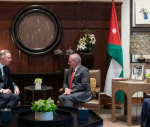You are here
The risk of competitive interest-rate hikes
Sep 12,2022 - Last updated at Sep 12,2022
NEW YORK — The world is facing the risk that major central banks will undertake competitive interest-rate hikes that may look desirable for their countries individually but could drag the world economy into an unnecessary recession. This scenario can still be avoided, but the window of opportunity is closing.
Aggressive interest-rate increases designed to combat high inflation at home make sense in isolation. For example, in view of the US Federal Reserve’s (Fed) prolonged underestimation of the persistence of US inflation, Chair Jerome Powell’s recent vow to continue hiking rates, despite the risk of recession, seems reasonable. To ensure that inflation expectations remain anchored at a low level, the Fed would prefer to err on the side of being too aggressive, rather than risk doing too little. Across the Atlantic, the European Central Bank (ECB) and the Bank of England (BoE) have also vowed to raise interest rates to deal with the highest inflation seen in decades.
The problem with this approach is that an interest-rate hike by any major central bank has the effect of exporting inflation to other countries, forcing other central banks to raise interest rates more than they otherwise would have done. For example, when the Fed raises its interest rate, if the BoE and the ECB do not respond, the pound and the euro would depreciate against the US dollar, leading to higher import prices and adding to the already high inflation. If the BoE and ECB respond by further raising their interest rates, they export a bit of extra inflation back to the United States and to other economies. The result is an interest-rate spiral that is more damaging to world output and employment than these countries may wish to see collectively.
For the 66 smaller economies that peg their currencies to the US dollar, especially those without significant capital controls, like Hong Kong, Panama and Saudi Arabia, local interest rates tend to rise automatically whenever the US raises its interest rate, even when higher rates are harmful to their economic prospects.
With global growth already slowing, owing to Russia’s war in Ukraine and the accompanying surge in energy and food prices, a wave of ever higher interest rates might push the world economy toward negative growth. With some coordination, the world’s major central banks might achieve the goal of controlling inflation with a less aggressive strategy than each would adopt in isolation. But heightened geopolitical tensions and deepening mistrust among some major economies are making policy coordination harder.
Fortunately, a globalised competitive interest-rate hike has not happened yet. In China and Japan, the world’s second- and third-largest economies, respectively, inflation is currently under 3 per cent, compared to 8 per cent or more in the US, the United Kingdom, and the eurozone. This means they do not need to raise their interest rates in response to the Fed, the ECB, and the BoE. In fact, the Chinese authorities are contemplating lowering interest rates to spur growth, and Japanese policymakers, who for decades have been more worried about deflation than inflation, do not seem overly concerned. For the moment, both countries appear willing to accept a depreciation of their currencies.
But this could change. With no end in sight for the war in Ukraine, energy prices are not expected to drop anytime soon. China and Japan are both big importers of oil and gas, so surging energy prices worry them more than they worry the US (a beneficiary of higher energy prices). While current Chinese and Japanese inflation rates are significantly lower than in other major economies, they are still rising fast: China’s has tripled since the beginning of the year, from an annualised rate of 0.9 per cent to 2.7 per cent, and Japan’s quintupled from 0.5 per cent to 2.6 per cent over the same period. If this trend continues, imported inflation will soon become a major policy concern for them, too.
Policymakers should seize the opportunity for cooperation before it’s too late. The coordinated response to the global financial crisis a decade ago provides a useful model for such cooperation. Back then, concerns about free-riding by other countries, including China, initially created a disincentive for each individual economy to take sufficiently bold action on fiscal stimulus. But discussions with China at the G-20 and other fora eased those concerns, and China’s large stimulus package raised demand for goods from Europe, the US, and elsewhere, making it more attractive for other countries to come up with their own sizeable stimulus packages. This multilateral effort helped mitigate the crisis.
This time around, escalating geopolitical tensions and the legacy of former US President Donald Trump’s trade war have deepened the mistrust among some of the world’s economic superpowers. While the nature of the economic challenge is different (inflation this time versus deflation back then), the need for policy coordination is similarly important to minimise output and job losses. If successful, this will also improve the chance for the policy coordination needed to win the global fight against climate change.
Shang-Jin Wei, a former chief economist at the Asian Development Bank, is professor of Finance and Economics at Columbia Business School and Columbia University’s School of International and Public Affairs. Copyright: Project Syndicate, 2022.













